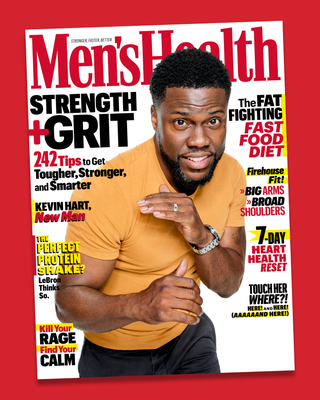7 Red Flags It's Probably a Nutrition Scam
As a registered dietitian, I’ve routinely cautioned my clients this: Just because something has a lot of hype doesn’t mean it’s legit.
I get the temptation to believe in the “latest thing.” Nutrition is a science that moves at the speed of light. Keeping up with the latest diets, supplements, and research can be a tough job. And sniffing out the nutrition scams? That’s even tougher.
It’s easy to be swindled into thinking that faulty nutrition information is true. Many of the people who sell complete malarkey look so good themselves. They sound like they know what they’re talking about by dropping complex technical terms.

Subscribe to Men’s Health
SHOP NOW
But there’s a big difference between convincing and truthful. In my years of experience within the nutrition field, I’ve seen countless nutrition scams come and go, and I’ve determined that there are seven important things all those scams have in common.
Read up, and you’ll forever protect yourself from shelling out for another “miracle” supplement or diet that ultimately doesn’t work.
1. There’s an emotional “rags to riches” story to draw you in.

sukanya sitthikongsak
Eliciting emotion in various ways is a proven marketing tactic.
Whether it’s a personal epiphany on top of a mountain in Tibet with butter coffee, or a story about being ‘cured’ of autoimmune disease by ‘cluster salts’ in celery juice—many nutrition scams use powerful stories to convince you of their benefits.
But a story is just that: a story.
Use your head, not your heart, when it comes to your health.
2. Scare tactics abound.
Fear can motivate, but using scare tactics as a selling point is disingenuous and irresponsible.
One popular diet falsely claims that nightshades and legumes are both “toxic” and “inflammatory,” which sounds ominous, especially because we have always known these foods to be healthy.
Using scary, hyperbolic words about the safety of the food we eat is never warranted and almost always signals a scam.
3. There’s an upsell.

GP Kidd
A lot of fads and scams either require you to buy their branded pills and powders, or they insinuate that you’ll be more successful if you purchase upgraded plans or products.
Many of these products—lectin blockers, gluten blockers, fat burners, and metabolic support supplements, for example—are completely useless.
If you’re a healthy, active person, there is absolutely no situation where losing weight or being healthy requires you to supplement your diet with special products.
4. There’s not an R.D. to be seen.
Far too many doctors are getting into the nutrition game by riding on their M.D. credential—and not much else.
The same goes for “nutritionists,” trainers, and anyone else who has no extended, formal training in nutrition.
Registered dietitians (R.D.s) aren’t the only professionals who understand food and the body, but it’s a red flag when someone’s only experience is that they’ve lost weight, or that they’re a personal trainer or doctor with an idea.
5. It claims to do something that has “never been done before.”

Konoplytska
No supplement has ever burned fat, and if it did, we’d all be thin.
And if a product or diet is that innovative, trust me when I tell you that the FDA would have its hands on it before you do.
6. It claims to do something that can’t be measured.
Cleansing, resting your organs, getting rid of adrenal fatigue and candida—all of these things aren’t measurable. It’s tough to assess the efficacy of a plan or product if you can’t measure the baseline and treated states.
7. The research has been done on rats, or by the company selling the product, or there’s no research at all—only testimonials.

Sol de Zuasnabar Brebbia
You’re not a rodent, and testimonials aren’t worth the paper (or computer) they’re written on. A recent survey showed that up to 40 percent of testimonials and reviews are false, so don’t assume that the ones you see are meaningful.
Source: Read Full Article
